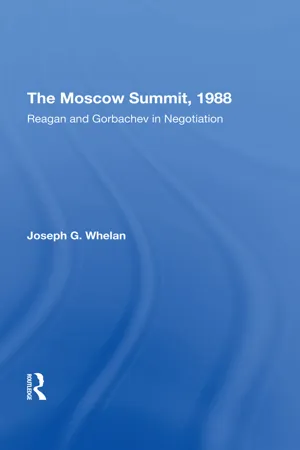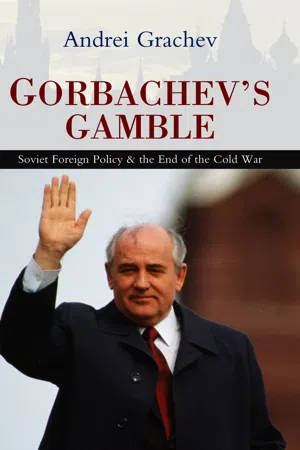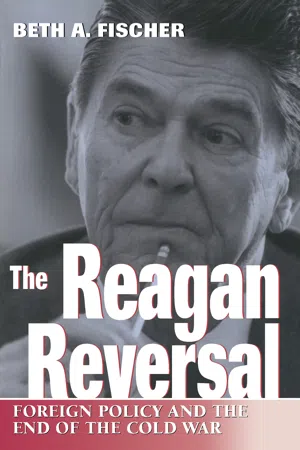History
Malta Summit
The Malta Summit was a meeting between U.S. President George H.W. Bush and Soviet leader Mikhail Gorbachev in December 1989. It marked the end of the Cold War and symbolized a new era of cooperation between the two superpowers. The summit resulted in the declaration that the Cold War was over and laid the groundwork for future arms reduction agreements.
Written by Perlego with AI-assistance
Related key terms
3 Key excerpts on "Malta Summit"
- eBook - ePub
The Moscow Summit, 1988
Reagan And Gorbachev In Negotiation
- Joseph G. Whelan(Author)
- 2019(Publication Date)
- Routledge(Publisher)
171The General Secretary portrayed the principal achievements at the Moscow meeting as being the “continuation of a dialogue” that “now envelops all key problems of world policy,” together with “a demonstration that this dialogue has become infused with a sense of realism” that insures its durability as a process. He regretted that “more could not have been achieved,” but he tempered this negative judgment with the observation that “politics is the art of the possible.” In his view the visit had also enabled the President to gain a better understanding of Soviet society, and he praised him for his “sense of realism.”172Recall that even before the Moscow meeting, Gorbachev had acknowledged in his interview with The Washington Post that, “The winds of the Cold War are being replaced by the winds of hope.” Whether true or not, the very discussion of such possibilities by Soviet and American negotiators indicated what was described as the “sweeping transformation” that was taking place in Soviet-American relations. What the summit represented in Gorbachev’s mind was, therefore, a further codification of that change. For, as Gorbachev told his Post interviewers, “the most important political result in the recent period of improvement in our relations is the regular and very productive political dialogue that we have been having.” “The important thing,” he added, optimistically, “is that if the dialogue continues, it will lead to specific achievements.173 - eBook - ePub
Gorbachev's Gamble
Soviet Foreign Policy and the End of the Cold War
- Andrei Grachev(Author)
- 2013(Publication Date)
- Polity(Publisher)
53 At the press conference Gorbachev announced to the journalists that the USSR no longer regarded the US as its adversary.Observed from the outside by other political leaders, the Malta Summit appeared to be an indisputable triumph for Gorbachev. According to Jacques Attali, the reaction of Mitterrand was unequivocal: ‘George Bush confirmed his support for Gorbachev’s policies and expressed his intention to integrate the USSR into the international community.’ As for the position of Gorbachev himself, according to the French President, ‘he has never looked so strong. He’s managed to dominate the Party leadership and progressively eliminate his political enemies.’54Yet Gorbachev’s psychological triumph at Malta unfortunately came too late. If he felt finally rewarded for his efforts (and patience), his satisfaction had a bitter taste; in order to reach this place he had invested an enormous amount of effort and taken numerous unilateral steps. As a result he had wasted an important part of what probably was his most valuable asset, his window of time to prove to the people of his country that his project was worth following and would bring rewards.Finally recognized as the ‘intimate partner’ of the West, he was no longer in a position adequately to fulfil this role, due to the progressive weakening of his internal position. While less and less in control of events at home because of the accelerating deterioration of the economic situation, he was increasingly dependent on Western help. In this new political environment, the initial function of foreign policy was transformed: once Gorbachev’s political trump card and the most effective way to promote the ‘new political thinking’, it increasingly had become perestroika’s last resort. Consequently the diplomatic sphere, which until then had largely been exempt from internal political battles, unexpectedly turned into a front line. ‘In the summer of 1989 the Supreme Soviet without a single opposing vote ratified my nomination to the position of Minister of Foreign Affairs,’ Shevardnadze writes bitterly, ‘but in October 1990 a number of People’s Deputies accused me of causing damage to the national interest.’55 - eBook - ePub
The Reagan Reversal
Foreign Policy and the End of the Cold War
- Beth A. Fischer(Author)
- 2013(Publication Date)
- University of Missouri(Publisher)
“Spheres of influence are a thing of the past,” the president declared. “Together we have a particular responsibility to contribute to political solutions to [regional conflicts]…. History displays tragic evidence that it is these conflicts which can set off the sparks leading to worldwide conflagration.” The president recommended periodic consultations among senior experts in order to discuss regional disputes. “The objectives of this political dialogue will be to help avoid miscalculation, reduce the risk of U.S.-Soviet confrontation, and help the people in areas of conflict to find peaceful solutions,” he asserted. 48 The Geneva Summit Meeting, November 1985 Although the Geneva summit meeting is often seen as the beginning of the end of the cold war, it was actually the culmination of the new Soviet policy that Reagan had introduced in January 1984. The Geneva summit embodied the administration's commitment to dialogue, cooperation, and understanding. Moreover, it took place only eight months after Gorbachev had become leader of the Soviet Union. He had not yet introduced glasnost and perestroika, and no one could foresee at that time how revolutionary the new Soviet leader would prove to be. The American approach to the Geneva summit meeting, therefore, could not have been merely a response to changes in Soviet policies. As already noted, the Reagan administration had been very evasive about a summit conference prior to 1984. In 1985, however, it was President Reagan who initiated the Geneva summit. On March 10, 1985, the Kremlin announced that Konstantin Chernenko had passed away. Within hours of learning that Gorbachev would be the new Soviet leader, the Reagan administration invited him to a summit meeting. No preconditions were attached. There was no agreed-upon agenda. There was no certainty that any concrete agreement would result from the conference. In fact, the administration did not yet know what Gorbachev's policy positions would be
Learn about this page
Index pages curate the most relevant extracts from our library of academic textbooks. They’ve been created using an in-house natural language model (NLM), each adding context and meaning to key research topics.


